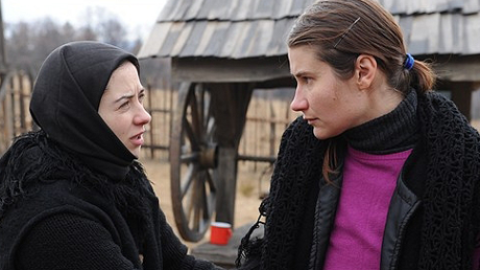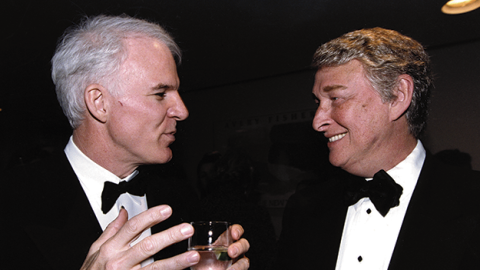Cannes 2012 Diary: Invasion of the Body

Rust and Bone
If there has been a defining motif to the first half of this year’s Cannes Film Festival, it has been that of the human body in extremis. Three of the strongest entries in the official competition—Jacques Audiard’s Rust and Bone, Ulrich Seidl’s Paradise: Love and Cristian Mungiu’s Beyond the Hills—feature central characters who are bound and gagged, for sale to the highest bidder, or literally cut off at the knees, in films that bring a physical, visceral intensity to stories of religious oppression, sex tourism and life on the margins of the working class. And this was before the unveiling of arguably the masterpiece of Cannes thus far, Michael Haneke’s Amour, with its unforgettable portrait of an elderly stroke victim slowly losing control of her body. (Still in the wings: the latest from the doyen of cinematic body horror, David Cronenberg.)
As it happens, all of those films also feature complex and demanding leading parts for women in a festival year that has been criticized by some PC bean counters for the absence of female directors in its lineup—no matter that good roles for women in front of the camera are nearly as scarce these days as those behind. But I digress.
Watching Rust and Bone, which Sony Pictures Classics acquired preemptively before its first Cannes screening, it’s easy to imagine all of the ways in which Hollywood might have fouled up this story of a killer-whale trainer (Marion Cotillard) who loses both her legs in a freak accident and, during her recovery, enters into a tentative romance with a stoic drifter (Matthias Schoenaerts) who moonlights as an amateur MMA fighter. Here, after all, is a setup rife with the potential for mawkish sentimentality and insipid inspirational platitudinizing. But Audiard quickly establishes a different set of parameters—namely, that this is not a movie about a woman who finds the courage to walk again. Rather, it is a movie about two people who must find the far greater courage to surrender themselves emotionally to one another.
They first meet shortly before her accident, in a nightclub where he’s working as a bouncer and she gets into a scuffle with one of the male patrons. And we sense right away that she is more comfortable communicating with fearsome beasts of the ocean than with other people, and that he is more at ease expressing himself with his fists than with words. There are other problems, too—problems of money and trust, of his ability to care responsibly for his 5-year-old son, of her willingness to let down her steely guard. When she does, they share a sex scene that ranks among the most genuinely erotic and believable in recent memory, for this is not just a movie of rust and bone, but of tears and sweat and flesh against flesh.
Audiard, who is best known in America for his electrifying, Oscar-nominated 2009 prison drama A Prophet, is the sort of director who never puts himself out in front of his material, and as such may be taken for granted by some critics as “just” an accomplished craftsman capable of working in a wide range of styles and genres. Look closely at Audiard’s work, however, and you can see that he creates entire cinematic worlds as distinctive as any proffered by more obvious “auteurs” like Pedro Almodóvar and Wong Kar-Wai. In Rust and Bone, that world is the underbelly of the French Riviera itself—a stone’s throw and yet many worlds away from the tapis rouges of the Palais des Festivals. It is a world of blue-collar laborers with weathered, non-movie-star faces and the faintly hunched countenances of people who have known hard, unrewarding work for most of their lives.
The actors are more than up to the challenge, particularly the commanding Schoenaerts, last seen as the violent cattle farmer in the Oscar-nominated Bullhead. He and Cotillard are intensely physical presences, too, exuding the sense of two people who must constantly test their own physical limits in order to feel truly alive—in the water, in the ring, and in the bedroom.

Paradise: Love
From one beach town to another, Seidl’s Paradise: Love deposits us at a Kenyan beach resort where corpulent, middle-aged European “sugar mamas” come in search of easy sex—and maybe something more meaningful—from the black African “beach boys” who are just as adept at exploiting their clients. “There Europe, here is Africa,” announces one of the “boys” early on, as Seidl draws a literal line in the sand—a stunning tableau image with the beached, bronzed tourists lined up along one side of the frame and the enterprising hustlers along the other, both receding into the infinite horizon. Where Seidl’s previous feature, Import/Export, explored the cultural, social, and economic collision between East and West, Paradise: Love sets its similarly pitiless sights on the meeting of North and South.
For those familiar with Seidl’s previous work—which includes documentaries about coke-snorting fashion models and obsessive animal lovers—it was easy to predict the critical response to his latest film before it had even screened. Once more, the accusations flooded forth that Seidl, who has been hailed as a master by the likes of John Waters and Werner Herzog, is a misanthrope who sees only the worst in people. Yet as an admirer of Seidl’s myself (and one who prefers to judge movies after seeing them rather than before), Paradise: Love strikes me as his boldest and most ambitious work to date—a confrontational yet oddly compassionate meditation on the residual chasm between Europe and its former colonies, profound loneliness in the so-called communication age, and the infinite varieties of the human body. On Saturday afternoon, I sat down with Seidl to talk about the film, its detractors, and its unusual evolution from a single project into a trilogy (the second two chapters of which are currently in postproduction and scheduled to premiere later this year).
Listen to complete audio of our conversation:

Beyond the Hills
Last but certainly not least, few if any films at Cannes this year were as highly anticipated as Beyond the Hills, the third feature by director Cristian Mungiu, who won the Palme d’Or in 2007 for the astonishing 4 Months, 3 Weeks and 2 Days, the movie most responsible for drawing international attention to the exciting new wave of young Romanian filmmakers. And make no mistake: Mungiu’s latest confirms all of the promise of his earlier films and then some. Based on an actual case that happened in Romania’s Moldova region in 2005, the film unfolds in and around a remote monastery where pious young women—many of them orphans who have merely migrated from one form of institutional living to another—toil dutifully under the ever-watchful eye of an austere priest known as Papa (played by the excellent Valeriu Andriuta).
As the film opens, a young woman named Alina (Cristina Flutur) arrives to visit her friend Voichita (Cosmina Stratan), one of the nuns in training. As children, the two women lived together in an orphanage where the obviously tough, short-tempered Alina served as a protector for her more delicate friend, and perhaps something more. Now, she wants Voichita to leave her cloistered life and return with her to Germany, but as the fateful hour draws near, Voichita seems ever less inclined to make the move, and so Alina stays on for a while, and that’s when the real trouble begins.
If 4 Months will forever be known colloquially as “the Romanian abortion movie,” then surely Beyond the Hills is already being spoken of along the Croisette as “the Romanian exorcism movie,” though there are no turning heads or pea-soup vomit to be seen. Mungiu’s latest invites comparisons to his last film in other ways too—like 4 Months, it focuses on two female friends who come into conflict both with each other and a strong, controlling patriarchal figure in an atmosphere of suppressed civil liberties, with the present-day Church here standing in for the Communist-era State. And like 4 Months, it is, moment by moment, gripping, brilliantly acted, and visually ravishing. (The cinematographer is once again Oleg Mutu, who together with Mungiu groups as many as a dozen actors at a time into staggering widescreen compositions that recall Renaissance frescoes.)
And yet, and yet, and yet, I must confess to feeling some small tinge of reservation about Mungiu’s film that I haven’t quite yet put my finger on, except to say that, whereas 4 Months, 3 Weeks and 2 Days left me feeling certain that every one of its directorial choices was entirely dictated by the needs of the story, in Beyond the Hills I sensed an occasional self-consciousness behind the staging and timing of certain scenes (particularly the final one), and a more general sense that Mungiu—who has admitted in interviews to a rushed postproduction schedule—hadn’t quite hit upon the perfect rhythm for the film. Which is not to say that I found the film “too long” (one of the most tiresome criticisms routinely aired against films at festivals), for the delicate business of finding a film’s rhythm is one that is just as often solved by adding scenes rather than cutting them away.
That may sound like I’m holding Mungiu up to an inordinately high standard, and I am, because Mungiu himself clearly aspires to greatness, and also because this is Cannes, where merely by showing up you beg comparison to the highest masters, past and present, of world cinema. Once again, Cristian Mungiu has proven himself worthy of their company.
Of the Haneke, more to come soon.







